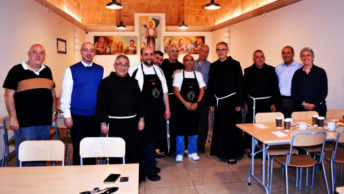Despite contrary feelings or inclinations toward prayer, we pray. Prayer is more powerful when we pray even though we would rather do something else. At times, praying morning prayer at an early hour may be annoying. We would rather sleep in, relax with a cup of tea, or read the newspaper. However, we resist the negative impulses that pull us away from prayer and just pray. To ignore the feelings and personal preferences of the moment is to strengthen a steadfastness and perseverance in faith. In the long run, this gives our spiritual life more substance and makes us more responsive to God‘s work within us. God works independent of our mood. It is easy to swim in the sea of the romantic and pleasing aspects of prayer, but grace sustains us when we must navigate through the storms of tensions and difficulties of prayer. Prayer is not so much a task we do, but a way to live.
At times, faithful Christians may dwell on the prodigal son’s brother. They may ruminate about how much ’fun’ notable sinners had before they converted, or returned to, the Church at the eleventh hour. However, when these thoughts persist, Christians need to look deeper at the truth that life inside God’s house is fuller and richer than life outside of God’s house could possibly be. There is no real depth or true beauty in self gratifying pleasures. If a person thinks a popular sin is attractive, he need only scratch its surface to discover a great illusion.
The ability to help others and receive help from others maintains a healthy balance. However, what if we are good at giving help but shy away from receiving help? For some, it is easier to do things for another than to have others do things for them. By not allowing others to help us, we restrict the grace they might receive by their service to us. Do we keep those who come to us for help at arms length because we fear they will see we are also in need? Do we maintain a protective barrier so that people will not find out who we really are? Receiving help exposes our vulnerability, and each one of us is vulnerable and flawed.
We are a servant among servants. In other words, the supervisor is our sister and the janitor is our brother. A mirror of humility keeps entitlements or aggrandizing behaviors in check. We need not set ourselves apart, or consider ourselves above the everyday humdrum workers that build the kingdom of God. From implementing a vital program to cleaning up a dirty church hall, no matter what the service, one should take on the role of a foot washer. Cleaning feet is a good way to begin guiding steps toward a desired goal. Jesus shows us the way.
You know, Lord, how I serve you with great emotional fervor in the limelight.
You know how eagerly I speak for you at the women’s club.
You know how I effervesce when I promote a fellowship group.
You know my genuine enthusiasm at a Bible study.
But how would I react, I wonder, if you pointed to a basin of water and asked me to wash the calloused feet of a bent and wrinkled old woman…day after day, month after month, in a room where nobody saw and nobody knew.
Ruth Harms Calkin, Tell Me Again, Lord, I Forget
We may have a special talent, or a PhD, but in service they must be part of a greater cause instead of an individual distinction. Although status and politics are inevitable in any Christian organization, they should not interfere with the Christian values of the organization. The structure, machinery and hierarchy within an organization should not deter spreading the kingdom of God on earth. The ‘I am’ changes to ‘we are.’ An individual good yields to the common good. Yes, each person in our service milieu can irritate, disappoint amaze or mystify us. However, with the help of grace, together we do the best we can to live the gospel and walk toward heaven.
We should not put an over importance on, or be too dependent on the results of our service. It is better to concentrate on the values and goodness of the service itself. In time, a service area may no longer be of use, or not achieve the expected results. We should avoid becoming overly involved in, or driven by, our service to the point of avoiding other life sustaining activities. Nor should our service mask or hide loneliness, deep seated problems with others, conflicts within ourselves, or obstruct spiritual development. Work is not a substitute for, or an expression of, daily prayer. Except for emergencies, work should not be done during the time set aside for prayer. When we pray, we pray. When we work, we work. One cannot thrive without the other.








